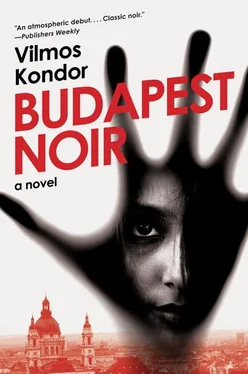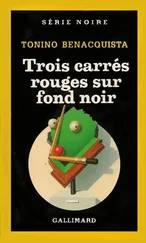“Zsigmond, Zsigmond. What have they done to you?” she asked, reaching for his right hand.
“They ran away in the end,” Gordon moaned, pulling away his hand.
“You stay here,” said Krisztina, running her fingers through Gordon’s bloody hair, “I’ll call Mór.”
Gordon replied, “Don’t you worry, for once I’ll stay right where I am.”
When Krisztina returned, she was carrying a wet towel that she now carefully wrapped around Gordon’s hand. She also wiped the blood from his face. When Mór arrived hardly ten minutes later, Gordon looked much better, given the circumstances. The old man took just one glance at him before pronouncing, “Call an ambulance.”
“Not that, Opa. Not that. You’re here, and that’s just fine for me.”
“Son, you won’t get far with me. I was just a wretched district doctor, not a surgeon.”
“Please try all the same, Opa,” said Gordon. The old man sighed. “I’ll examine you in your flat. If you can get up there, that is. If you can’t, you’re off to the hospital.”
Gordon slowly staggered to his feet. Mór and Iváncsik each reached for an arm, then helped him up to the second floor. Krisztina had already opened the door and in the bathroom had put out a few sheets along with the first-aid kit they’d gotten from Mór. Gordon sank into a chair, and Krisztina gradually undressed him. Although she had to cut the trousers off him, she managed to pull the rest off. Using the sheets, she then washed Gordon’s upper body and thoroughly cleaned the wound on his forehead and his lips.
“Can you go into the room, son?” asked the old man, eyes sparkling with worry from behind his round glasses.
“Yes, Opa,” replied Gordon. With Krisztina’s help, he went into the bedroom and collapsed on the bed.
“Krisztina, can you give us a minute?” said Mór. He then opened his medical bag and proceeded to examine Gordon. Once finished, he said, “If you don’t piss blood tomorrow, you can stay at home. But if you do, it’s off to the hospital with you.” Krisztina, who of course had not left the room but was leaning up against the doorjamb, sighed with relief. “And your hand didn’t break, either,” continued Mór, “just one of your fingers snapped out of joint, that’s all. I’ll set it back in place. It will hurt, but I’ll do it fast.” Gordon nodded, and the old man grabbed his wrist tight with his left hand and his index finger with his right. First he yanked the finger forward, then pressed it back in place. Tears formed in Gordon’s eyes.
“You didn’t say it would be like this, Opa.”
“And I haven’t even tended to your head wound,” said Mór. “You’re just lucky it’s not long, otherwise it would have to be sewn up, and I don’t like doing that. The blow tore a vein, which explains the blood. Krisztina, hand me the iodine.” He wrapped a matchstick in cotton, dipped that in the little bottle, then thoroughly cleaned out the wounds on Gordon’s forehead and lips.
“Drink this, Zsigmond,” said Krisztina, handing him a cup.
The old man nodded by way of approval. “Go ahead and drink it, son.”
Gordon gulped down the plum brandy. His eyes slowly closed and his head slumped to the side.
Six
When Gordon awoke in the wee hours of the next morning, he felt firsthand the typical boxer’s refrain: “In the ring it only hurts a little. Afterward it hurts more. But that’s nothing. The real pain comes the next day.”
Everything hurt. His head and his kidneys throbbed with pain, as did the fingers and palm of his right hand. But he could stand. He staggered out to the living room. Krisztina was sitting in front of the window, drawing by the light of the reading lamp. Leaning against the door, Gordon watched her. He had watched her draw on several occasions, sometimes for as long as a half hour. He’d seen many illustrators—mainly police artists and court reporters—but their work had never absorbed him so. Sometimes he, too, tried his hand at drawing, but he was incapable of decently depicting even a street map. Krisztina’s hand moved over the paper with complete, consummate confidence. Hardly ever did she stop to think, and rarely did she make a mistake. She’d already illustrated several storybooks, and as only Gordon knew, when it came to drawing children, Krisztina’s models were her relatives. She hadn’t seen them for years, but she had preserved their memory since childhood. Since she was of Saxon descent, it was clear from the outset that she would study in Germany. Her father had relatives in Weimar, and so Krisztina attended the Bauhaus school there. She did not hold firm to this approach to art but gladly went about planning posters and building façades, and, indeed, the pavilion of the light-bulb manufacturer Tungsram at the Budapest International Fair was built from her designs. Never did she have a normal job, no matter what that might have meant. She always worked alone, on request, and never went looking for work—work always found her. Gordon often asked her: “And when will there be a Krisztina Eckhardt exhibit?” Krisztina hated being called an artist; the only thing she hated more was being called a suffragette. Men were both suspicious of her and respected her; behind her back they gossiped about her. Not that she cared. While she didn’t deny that she agreed with the movement for women’s equal rights, she wasn’t too vocal about it, either. “People should stick to asking about what I draw and design,” she often told Gordon. The upshot was that she didn’t have girlfriends, either, in the traditional sense. She didn’t understand women who suffered in bad marriages, women who kept lovers, and what she deemed the meaningless self-sacrifice supposedly endured for the sanctity of marriage and family. Rarely did she go out with friends, and when she did, it was with similar women. And they played cards. Bridge, which Gordon just didn’t get. For him, the only mystery greater than Krisztina herself was bridge.
And so Gordon stood there in the doorway, his limbs hurting, burning, throbbing. Mór was sleeping on the divan. Krisztina rose to put a blanket over him. That’s when she turned and saw Gordon. She cast him an angry look and was about to say something when Gordon brought a finger to his lips. He motioned for her to join him in the bedroom.
“You’ll find a letter in the inside pocket of my blazer,” he said when Krisztina entered the room. He was sitting on the edge of the bed and trying hard not to move. “Bring it over to me.”
Krisztina found the envelope, looked it over, and extended it to Gordon. “Read it out loud, Krisztina,” he said. “I don’t think I could even pick it up.” Krisztina opened the envelope and pulled out a sheet of paper folded in two. She cleared her throat and began to read:
My dear, sweet Fanny, I miss you like the devil. I miss you terribly. What will I do with myself without you? The days drag along, and not even the Torah helps. I look to it for answers, but find none. I seek answers everywhere. What is the answer if I love you with all my heart, and our being together is more important to me than everything else? What is the answer to their wanting to tear us apart? It’s not by chance that my father became a rabbi. Maybe he doesn’t really know the answer to everything, but he acts as if he does, and that’s enough for people to believe him. They respect him, they love him, they fear him. I share with them only the last of these sentiments. My love is now for you alone. Remember what I told you in that restaurant? Well, don’t forget it. And don’t forget me, either. I’ll work things out somehow—how, I don’t yet know, but I’m constantly racking my brains. To finally be able to be with you, to be able to freely kiss your lips, to freely hold your hand, to freely look upon your lovely eyes. I want to make up for everything—for everything—and it is my firm intention that you should be the happiest woman in the world, even if no one else wants this to be so. Your devoted Shlomo.
Читать дальше
Конец ознакомительного отрывка
Купить книгу












